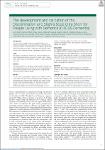The development and validation of the Discrimination and Stigma Scale Ultra Short for People Living with Dementia
| dc.contributor.author | Bhatt, J | |
| dc.contributor.author | Brohan, E | |
| dc.contributor.author | Blasco, D | |
| dc.contributor.author | Oliveira, D | |
| dc.contributor.author | Bakolis, I | |
| dc.contributor.author | Comas-Herrera, A | |
| dc.contributor.author | D'Amico, F | |
| dc.contributor.author | Farina, N | |
| dc.contributor.author | Knapp, M | |
| dc.contributor.author | Stevens, M | |
| dc.contributor.author | Thornicroft, G | |
| dc.contributor.author | Wilson, E | |
| dc.contributor.author | Salcher-Konrad, M | |
| dc.contributor.author | Yang, L | |
| dc.contributor.author | Evans-Lacko, S | |
| dc.date.accessioned | 2023-09-01T10:29:29Z | |
| dc.date.available | 2023-09-01T10:29:29Z | |
| dc.date.issued | 2023-09 | |
| dc.identifier.issn | 2056-4724 | |
| dc.identifier.issn | 2056-4724 | |
| dc.identifier.other | e164 | |
| dc.identifier.uri | https://pearl.plymouth.ac.uk/handle/10026.1/21273 | |
| dc.description.abstract |
Background The recent World Health Organization (WHO) blueprint for dementia research and Lancet Commission on ending stigma and discrimination in mental health has identified a gap around dementia-related measures of stigma and discrimination that can be used in different cultural, language and regional contexts. Aims We aimed to characterise experiences of discrimination, and report initial psychometric properties of a new tool to capture these experiences, among a global sample of people living with dementia. Method We analysed data from 704 people living with dementia who took part in a global survey from 33 different countries and territories. Psychometric properties were examined, including internal consistency and construct validity. Results A total of 83% of participants reported discrimination in one or more areas of life, and this was similar across WHO Regions. The exploratory factor analysis factor loadings and scree plot supported a unidimensional structure for the Discrimination and Stigma Scale Ultra Short for People Living with Dementia (DISCUS-Dementia). The instrument demonstrated excellent internal consistency, with most of the construct validity hypotheses being confirmed and qualitative responses demonstrating face validity. Conclusions Our analyses suggest that the DISCUS-Dementia performs well with a global sample of people living with dementia. This scale can be integrated into large-scale studies to understand factors associated with stigma and discrimination. It can also provide an opportunity for a structured discussion around stigma and discrimination experiences important to people living with dementia, as well as planning psychosocial services and initiatives to reduce stigma and discrimination. | |
| dc.format.extent | e164- | |
| dc.format.medium | Electronic | |
| dc.language | en | |
| dc.publisher | Cambridge University Press | |
| dc.subject | Stigma and discrimination | |
| dc.subject | epidemiology | |
| dc.subject | low- and middle-income countries | |
| dc.subject | rating scales | |
| dc.subject | dementias/neurodegenerative diseases | |
| dc.title | The development and validation of the Discrimination and Stigma Scale Ultra Short for People Living with Dementia | |
| dc.type | journal-article | |
| dc.type | Article | |
| plymouth.author-url | https://www.ncbi.nlm.nih.gov/pubmed/37650126 | |
| plymouth.issue | 5 | |
| plymouth.volume | 9 | |
| plymouth.publication-status | Published | |
| plymouth.journal | BJPsych Open | |
| dc.identifier.doi | 10.1192/bjo.2023.551 | |
| plymouth.organisational-group | |Plymouth | |
| plymouth.organisational-group | |Plymouth|Faculty of Health | |
| plymouth.organisational-group | |Plymouth|Users by role | |
| plymouth.organisational-group | |Plymouth|Users by role|Academics | |
| plymouth.organisational-group | |Plymouth|Faculty of Health|Peninsula Medical School | |
| dc.publisher.place | England | |
| dcterms.dateAccepted | 2023-07-17 | |
| dc.date.updated | 2023-09-01T10:29:29Z | |
| dc.rights.embargodate | 2023-9-2 | |
| dc.identifier.eissn | 2056-4724 | |
| dc.rights.embargoperiod | forever | |
| rioxxterms.versionofrecord | 10.1192/bjo.2023.551 |


